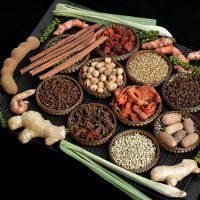For years, New 6 Medicinal Herbs That Have Been Proven Clinical Jakarta, Indonesia are rich in biodiversity, so it is potential to develop traditional medicine. However, due to lack of much research in recent years there are only 6 types of herbs that have been clinically tested.This means that over the years, there are only 6 types of herbs that have been tested here's efficacy and safety in humans. Herbs that have been clinically proven to increase 'rank' to fitofarmaka, which can be equated with the utilization of modern chemical drugs.
Jakarta, Indonesia are rich in biodiversity, so it is potential to develop traditional medicine. However, due to lack of much research in recent years there are only 6 types of herbs that have been clinically tested.This means that over the years, there are only 6 types of herbs that have been tested here's efficacy and safety in humans. Herbs that have been clinically proven to increase 'rank' to fitofarmaka, which can be equated with the utilization of modern chemical drugs.
In addition to 6 herbs that have become fitofarmaka, there are also 38 herbal medicinal status was not just ordinary. Herbs that have become Standardized Herbal Medicines (OHT), which means that the efficacy and safety has been tested in preclinical or in animals.Given the very slow development of herbal research, the Ministry of Health is now heavily saintifikasi herbs. The goal is not to provide an adequate scientific evidence about the efficacy and safety of herbs native to Indonesia, to be used by physicians in health care."If there are herbs that taste can be standardized herbal, so do not be so herbs keep dong," said Dr. Abidinsyah Siregar, DHSM, Kes, Director of Health Services Traditional, Alternative and Complementary Health Ministry in the House on Friday (2/3 / 2012).Currently, the Ministry of Health is developing a 4 formula of herbal ingredients to be tested in 60 health centers that formula antihypertensive, antidiabetic, and antikolesterolemia antiglikemia. If successful passes 65 percent, then the formula can be used by physicians.These ambitions are not excessive at all, because Indonesia was known to be rich in biodiversity. Estimated from the entire medicinal plant that grows in Asia, 90 per cent or 7 thousand species of them can be found in various parts of Indonesia.Moreover, during this, many modern drugs are initially created from herbs native to Indonesia. Call it cancer drugs vincristine and vinblastine are used throughout the world, originally made from extracts of virgin tread is also grown in Indonesia.Public confidence in traditional medicine also provides its own support. The results of Health Research Association (Riskesdas) 2010 showed that 55.3 percent of Indonesia's population uses traditional medicine for health care and 95.6 percent of them recognize the benefits.
 Jakarta, Indonesia are rich in biodiversity, so it is potential to develop traditional medicine. However, due to lack of much research in recent years there are only 6 types of herbs that have been clinically tested.This means that over the years, there are only 6 types of herbs that have been tested here's efficacy and safety in humans. Herbs that have been clinically proven to increase 'rank' to fitofarmaka, which can be equated with the utilization of modern chemical drugs.
Jakarta, Indonesia are rich in biodiversity, so it is potential to develop traditional medicine. However, due to lack of much research in recent years there are only 6 types of herbs that have been clinically tested.This means that over the years, there are only 6 types of herbs that have been tested here's efficacy and safety in humans. Herbs that have been clinically proven to increase 'rank' to fitofarmaka, which can be equated with the utilization of modern chemical drugs.In addition to 6 herbs that have become fitofarmaka, there are also 38 herbal medicinal status was not just ordinary. Herbs that have become Standardized Herbal Medicines (OHT), which means that the efficacy and safety has been tested in preclinical or in animals.Given the very slow development of herbal research, the Ministry of Health is now heavily saintifikasi herbs. The goal is not to provide an adequate scientific evidence about the efficacy and safety of herbs native to Indonesia, to be used by physicians in health care."If there are herbs that taste can be standardized herbal, so do not be so herbs keep dong," said Dr. Abidinsyah Siregar, DHSM, Kes, Director of Health Services Traditional, Alternative and Complementary Health Ministry in the House on Friday (2/3 / 2012).Currently, the Ministry of Health is developing a 4 formula of herbal ingredients to be tested in 60 health centers that formula antihypertensive, antidiabetic, and antikolesterolemia antiglikemia. If successful passes 65 percent, then the formula can be used by physicians.These ambitions are not excessive at all, because Indonesia was known to be rich in biodiversity. Estimated from the entire medicinal plant that grows in Asia, 90 per cent or 7 thousand species of them can be found in various parts of Indonesia.Moreover, during this, many modern drugs are initially created from herbs native to Indonesia. Call it cancer drugs vincristine and vinblastine are used throughout the world, originally made from extracts of virgin tread is also grown in Indonesia.Public confidence in traditional medicine also provides its own support. The results of Health Research Association (Riskesdas) 2010 showed that 55.3 percent of Indonesia's population uses traditional medicine for health care and 95.6 percent of them recognize the benefits.
No comments:
Post a Comment